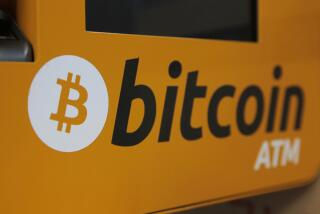SEC’s new crypto czar wants digital coin industry to step out of the shadows

The U.S. Securities and Exchange Commission is well known for bringing landmark cases against the biggest names in finance.
But its powers to punish individuals and companies can also be intimidating, something that’s very much on the mind of Valerie Szczepanik, the SEC’s new top official overseeing the nascent cryptocurrency industry. In taking her new job last month, she left the regulator’s vaunted enforcement division and joined a less renowned SEC unit that oversees initial public offerings and other corporate stock sales.
A key reason for a less-confrontational approach: digital-token enthusiasts’ deep mistrust of government. They’re hesitant to discuss their business with the SEC’s market cops out of fear of being investigated, or even worse, shut down.
“We want people to come talk to us,” Szczepanik, 51, who practices jiujitsu in her spare time, said in an interview. “When I’m in meetings with folks, I want them to see me as someone who’s interested in communication and back and forth, and looking to encourage innovation that helps investors and the markets.”
Szczepanik’s June promotion to be the SEC’s first-ever senior advisor for digital assets reflects a recognition of the challenges posed by virtual coins. Billions of dollars are pouring into largely unregulated tokens each month, much of it coming from small-time traders.
Investors’ excitement stems in large part from bitcoin’s meteoric rise until recently. The SEC has shown it’s less jazzed about the world’s biggest cryptocurrency. Last week, the regulator issued its latest rejection of a bitcoin exchange-traded product, citing concerns that exchanges can’t adequately police trading in the underlying digital tokens and that manipulation might be widespread. Bitcoin’s price fell below $8,000 on Monday, 60% off its peak of $19,782 last December.
Other agencies have also determined that crypto merits a targeted response, as the Justice Department and Commodity Futures Trading Commission have each appointed their own point people on virtual coins. It might be one of the few areas that watchdogs agree merits more oversight, not less, amid President Trump’s deregulatory agenda.
The SEC is concerned the market for initial coin offerings, in which companies raise money from investors by selling digital tokens, is rife with pump-and-dump scams, Ponzi schemes and other types of misconduct. While the agency has brought some cases, critics question why there haven’t been more.
The amount of money being thrown at token offerings is staggering. Last month, ICOs raised a record $5.6 billion, according to data compiled by Coinschedule.
The SEC determines whether certain coins are securities that should be subject to the same tough trading and disclosure rules as stocks. Such SEC announcements have resulted in traders making, or losing, big sums of money within seconds.
Growing interest among hedge funds and other traders has encouraged more traditional financial firms to dabble in cryptocurrencies. Intercontinental Exchange Inc., the owner of the New York Stock Exchange, has been working on a trading platform that would let investors bet on bitcoin, two people familiar with the matter said in May.
The presence of established, regulated players could help pull crypto out of the shadows. But if the market remains opaque, the SEC might get more aggressive, Szczepanik warned.
“What we’re hoping is people will want to come into compliance,” she said. “If there’s no effort to do that, if instead folks choose to ignore applicable laws, we might take a different tack.”
More to Read
Inside the business of entertainment
The Wide Shot brings you news, analysis and insights on everything from streaming wars to production — and what it all means for the future.
You may occasionally receive promotional content from the Los Angeles Times.










